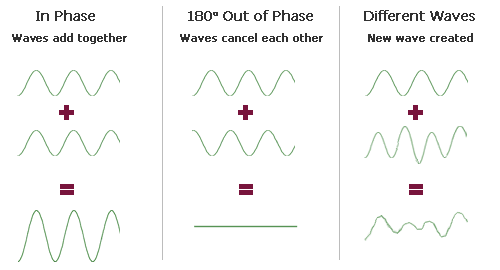They sound practically identical, and they can have similar effects, but the way these two technologies work is completely different. Noise isolating headphones are generally in-ear headphones; These are the small buds that actually go inside your ear canal. They work just like ear plugs by filling your ear canal so no outside sound can come in. If you imagine ear plugs that have tiny speakers in them, that's exactly what noise isolating is. They physically block out sound while piping in your audio through the same plugs.
Noise cancelling is a lot more complicated and thus usually a lot more expensive than noise isolating. As you may know, sound travels in waves. Noise cancelling headphones actually produce sound waves that cancel out the most common "noises." Here's a quick diagram from mediacollege.com that shows what happens:
Noise cancelling is the middle example. You have two waves that are complete opposites and when they hit each other they cancel out-- hence noise cancelling. At this point you may be asking how the headphones can make such a sound to do this. Not nearly as easily as noise isolating, that's for sure. Noise cancelling headphones are going to be over the ear headphones, meaning they're actually little cups that go over your entire ear, and in those cups it's going to have the hardware that makes those sound waves and the extra batteries required to make them. That's right, noise cancelling headphones usually require their own separate batteries.
Practical Tip of the Day:
If you're looking for noise reduction during your gym visit, I generally recommend getting noise isolating in-ear headphones. Their smaller design and smaller price point makes them good gym buddies since you won't be walking around the gym floor with big $300 headphones on. If you travel a lot, especially by plane or train, noise cancelling might be better as they can reduce noise more, and generally people find them more comfortable for long-term wear since they don't actually enter your ears.

No comments:
Post a Comment